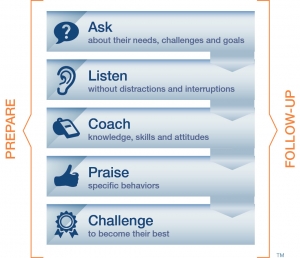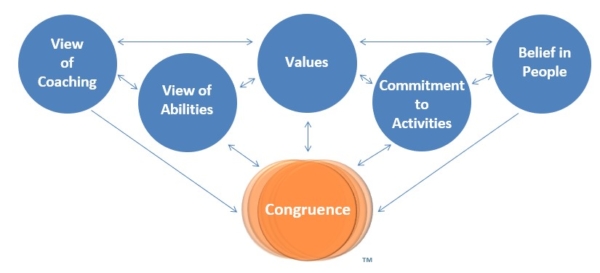Why is Coaching Still Elusive? (and What to Do About It…)

A manager’s willingness to have regular coaching conversations and their effectiveness as a coach are ultimately based on three critical factors.
This isn’t another blog on the value of coaching.
The research has been conducted, the books have been written, the jury is in: There are direct business outcomes that can be achieved when managers incorporate coaching into their role. This high level of awareness about the critical need for coaching has been fueling retreats, training, online social learning, white papers and incentives, among a myriad of other initiatives.
So let’s not waste time talking about the value of coaching. What I am going to talk about is why—despite all this awareness of the benefits—coaching still isn’t happening.
A Sales Management Association study into coaching indicates that 77% of organizations report that they do too little coaching. And the majority of those that actually are conducting coaching say that it’s ineffective.
Does that ring true as you look across your organization?
The question then is, why the discrepancy between what organizations know they should be doing and what is really happening? In hundreds of instances where we have asked managers directly about their coaching activity, the response is consistently some version of “no time!” or “too busy!” However, when we recently polled people and asked them to rate not themselves personally but their organization’s management team, we got an entirely different response.
Participants in this poll of over 450 organizations told us the number one reason—selected by 44% of respondents—that coaching doesn’t happen is managers lack the skill/capability to coach. Another 23% said managers don’t prioritize coaching. Respondents also told us that less than a quarter (just 22%) of their managers embrace coaching, while the remainder are either reluctant (45%), strongly avoid it (4%) or simply “tolerate it” (29%).
Could it be that “no time” is just a safe way for managers to say, “I don’t have the skills or confidence to coach”? For any of us, if we don’t have confidence in our ability to do a task well, it’s only natural that we’ll find other activities to prioritize in its place.
We picked up another interesting finding from our recent survey: Many organizations are making a fundamental mistake as they try to address this coaching gap—they’re only focusing on one of the three critical coaching conversations.
Let’s take a look at those three conversations and how they influence a manager’s willingness and effectiveness as a coach.
Three Coaching Conversations:
#1: Conversations with Employees: Managers need a track to run on when it comes to coaching, a coaching process that they can have confidence in. This is their coaching skillset—the tangible, observable skills that managers are crying out for to solve the skills/capabilities challenge. The following five-step process will give your managers that platform.

The one step I’ll highlight here is the first one: Ask. The quality of the questions that the manager asks will set the tone for coaching conversations.
Action Item for Your Managers: Have them take the time to prepare a few questions prior to the coaching conversation to help advance the discussion toward reflection and discovery. A few examples of these kinds of questions include:
- What are your top commitments in your role for this coming year? How can I best support your pursuit of those?
- You have a lot on your plate at the moment. What obstacles do you think you might face as you work toward your goal?
- In order to achieve this goal, what smaller sub-goals will you need to hit? What actions can you take this week to get started on making progress?
- What could you do that’s a stretch for you at the moment but would be a breakthrough for you?
- How can I hold you accountable toward the progress you’ve identified as important without it feeling like you’re being micro-managed?
#2: Conversations with Themselves: These internal moments of reflection are the most frequently overlooked factor that contribute to the success or lack of success of coaching initiatives.
While managers may have several coaching conversations with their employees during the course of a day, they will have dozens of conversations with themselves about their coaching. This is the coaching mindset. How managers think about coaching, and how they internalize their own ability and the potential of their employees, will ultimately determine their success. Any coaching training must incorporate this essential element for long-term success. The majority of those polled during our webinar agreed, saying this is the area that’s most important for their managers to develop.
There are five components to conversation #2:

One component—“View of Coaching”—is especially noteworthy. If you stop 50 managers and ask them to describe their perception of what coaching is, you may get 50 different answers. If you are developing coaching initiatives in your organization, it’s critical to make sure that everyone clearly understands what effective coaching is, and what it is not. You may be surprised at the variety of perceptions within your management team.
#3: Conversation with their Coach: Who is coaching the coaches in your organization? How is the executive team directly supporting coaching? What messages are senior leaders sending, either consciously or unconsciously, regarding the importance of coaching?
It’s great to train the front-line managers on effective coaching skills. But if this is not being supported environmentally within your organization, managers will be facing challenging headwinds to sustaining any momentum.
You know coaching is important. If managers in your organization aren’t consistently doing it, look beneath the surface. Otherwise, you may fall into the trap of addressing symptoms rather than causes. Make sure you’re getting at the real reasons for this discrepancy as you focus on bridging that gap.

Chief Sales Officer
Related Blog Posts



